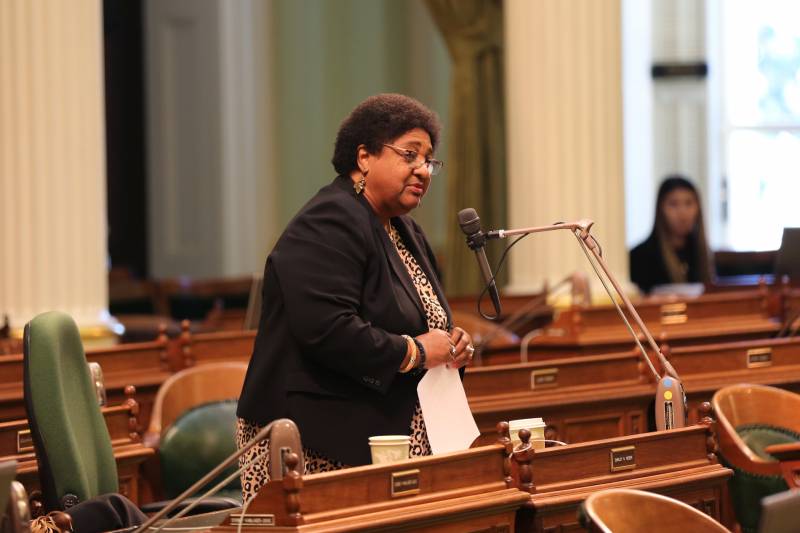

Dr. Shirley Weber, a Democratic assemblywoman from San Diego, was confirmed as California’s secretary of state on Thursday, winning approval in the state Senate a day after the Assembly gave her nomination unanimous support.
Weber will become California’s first Black secretary of state. Born in Jim Crow-era Arkansas, Weber’s family fled to California after her father was threatened by a lynch mob.
“How ironic it is that a girl whose father could not vote, whose grandparents never had a chance to vote, is now responsible for 40 million Californians and their right to vote,” Weber said on Wednesday, after the Assembly approved her nomination on a 70-0 vote.
Weber will fill the vacancy created by former Secretary of State Alex Padilla’s appointment to the U.S. Senate. She will become the state’s top elections official in the wake of an election with historic levels of voter turnout in the midst of widespread changes to the voting process brought on by the COVID-19 pandemic.
Before serving four terms in the state Assembly, Weber was a member of the San Diego Board of Education and spent decades as a professor at San Diego State University.
The Assembly broke into applause after the vote to confirm Weber was recorded, reflecting the widespread and bipartisan admiration for Weber in the state Legislature, where she is known as a conscientious lawmaker and powerful orator.
“Anytime Dr. Weber speaks, we all listen,” said Assemblyman Mike Gipson, D-Carson.
During her time in the Assembly, Weber has spearheaded efforts to reform laws governing police use of force and ensure the right to vote for Californians in county jail.
Dana Williamson, a former adviser to Jerry Brown, tweeted that the former governor “used to make us all be quiet when [Weber] would speak on the floor.”
Even Republicans who opposed Weber’s nomination offered praise, and no legislator voted against her confirmation. In the Senate, all nine Republicans abstained from the 29-0 vote.
“Even during passionate debate, she always showed the greatest kindness to myself and my colleagues,” said state Sen. Shannon Grove, R-Bakersfield. “And I think that speaks of a statesperson.”
In both houses, this week’s confirmation process played out as a celebration of one of the Legislature’s most revered members, while also offering a preview of Weber’s agenda for the office.
“She is a force of nature and a force for good,” said Senate Pro Tem Toni Atkins, D-San Diego, before Thursday’s vote. “Being the state’s chief elections officer is an awesome responsibility.”
In committee hearings, Weber said she’d focus on maintaining the state’s recent high levels of voter engagement.
Weber on Her Family's Journey to CADuring Padilla’s six-year tenure, California transitioned towards more widespread use of vote by mail, while voter registration and participation climbed in both presidential and mid-term elections. In 2020, 70% of eligible voters and 80% of registered voters cast a ballot, benchmarks not reached in decades.
Democrats in the Legislature are hoping to enshrine some of the voting changes brought on by the pandemic — namely, sending every registered voter a ballot by default, an idea piloted statewide in 2020 in order to encourage voting at home during the pandemic. On Thursday, the state Senate approved continuing universal vote-by-mail for elections held in 2021. That bill now goes to the Assembly.
Weber has said she supports legislation to permanently mail voters a ballot, and she told an Assembly committee that she would back efforts to phase out the use of assigned polling places under the Voters Choice Act. That law (currently optional for counties) allows a transition from neighborhood polling places to larger vote centers that are open for longer hours and can be used by any voter in the county.
“The Legislature could mandate it and I would probably be very supportive of them doing that,” Weber said. “I think it does begin to address the issue of accessibility and making sure that everyone has a chance to vote.”
“How ironic it is that a girl whose father could not vote, whose grandparents never had a chance to vote, is now responsible for 40 million Californians and their right to vote?” Dr. Shirley Weber, California secretary of state
Weber suggested that counties only be required to offer three days of early voting, instead of the 11 currently prescribed by law, which could help local election officials better afford and manage a shift to the vote center model.
Unlike Padilla, Weber said she is opposed to allowing 17-year-old Californians vote in primary elections if they turn 18 by the general election. That was the change proposed by Proposition 18 last year, which was rejected by voters.
“I’m opposed to it and have voted against it in the past,” said Weber. “We can begin the conversation again but once [the state] voted against it, it’s like, do we take it up again and again and again?”
In her hearing before the Senate Rules Committee on Wednesday, Weber was pressed by Republicans to lead a clean-up of dead and inactive voters in the voter rolls and adhere to the state’s rules on contracting. Padilla was criticized for authorizing a contract with a Democrat-affiliated firm for statewide voter education, despite the Legislature’s instruction to send the money to counties.
State Sen. Scott Wilk, R-Santa Clarita, asked Weber if she agreed that her office would have “no authority to simply choose the amount you think is appropriate to spend.”
“Sure, you stay within the confines of the allocation,” Weber responded.
Weber will serve the final two years of Padilla’s term, and has vowed to seek reelection in 2022.